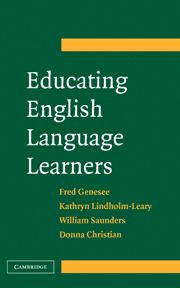5 - Academic Achievement
Published online by Cambridge University Press: 13 July 2009
Summary
INTRODUCTION
Academic achievement broadly refers to the communicative (oral, reading, writing), mathematical, science, social science, and thinking skills and competencies that enable a student to succeed in school and society. Because these forms of achievement are difficult to assess, most researchers have relied on a more narrow definition that is largely limited to outcomes on standardized achievement tests. In this chapter, academic achievement refers to content-area achievement as measured in English mathematics, science, or social studies (e.g., history, geography); it does not cover the content areas of English language arts (addressed in Chapter 4), foreign language or other humanities (music, art, theater), or cognition (except as it specifically relates to science or mathematics problem solving). The topic of reading achievement is included if the outcome measure is a standardized test and the study assesses reading and mathematics achievement of one or more educational programs. While many of the studies included in this chapter assess academic achievement by means of standardized achievement tests, others use general measures of school attainment, such as grade point average (GPA), high school drop-out rates, and attitudes toward school and school-related topics.
The academic achievement of ethnic and language minority students has received considerable attention especially as it relates to the underachievement of Hispanics, African Americans, Native Americans, and ELLs. This chapter examines only ELLs and does not consider research on the achievement of Hispanic, Asian-American, or other ethnic minority or immigrant students, except as the samples and results pertain to ELLs.
- Type
- Chapter
- Information
- Educating English Language LearnersA Synthesis of Research Evidence, pp. 176 - 222Publisher: Cambridge University PressPrint publication year: 2006
- 7
- Cited by



